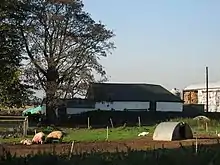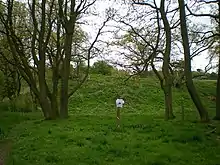Fordhall Farm
Fordhall Farm is an organic farm of 128 acres, in Market Drayton in north Shropshire, England. It is owned by an industrial and provident society, the Fordhall Community Land Initiative (FCLI), whose aim is to use the farm for community benefit. The farm became a cause célèbre in 2005, when a campaign to raise funds for FCLI to purchase the land gained national press attention.

Within the boundaries of the farm are the remains (earthworks) of Fordhall castle, a scheduled Norman ringwork-and-bailey castle.
History

The ringwork was first noted as recently as 1950, although the name of its location, Castlehill Wood, certainly predates the 20th century.[1] The ringwork has been identified with Moretoin Castle, attested in 1215 and possibly the castle mentioned by the antiquary Leland as 'Draiton apon Terne'.[2] It is a monument scheduled under the Ancient Monuments and Archaeological Areas Act 1979 ("Ringwork and bailey castle 390m west of Buntingsdale Hall, List entry Number 1019659") [3]
The farm was formerly part of the Buntingsdale Hall estate, which was broken up in the 20th century. The tenant was an early adopter of organic farming practice, as well as being one of the first producers of yoghurt in the United Kingdom [4][5]
Bringing the farm into collective ownership
The farm became a cause célèbre in 2005.[6] A campaign was launched on 28 September 2005 to raise funds to purchase the land and bring it into collective ownership. The project had widespread support from celebrities including Alan Titchmarsh, Prunella Scales and Sting, and gained national press attention.[7][8][9] The landowner agreed to sell the farm for £800,000 to the Fordhall Community Land Initiative by 1 July 2006. As a result of the campaign, the purchase money was raised. Over 7500 people bought £50 shares, raising £600,000, with £100,000 interest free loans and a £100,000 loan from Triodos Bank.[10] The Fordhall Community Land Initiative is an industrial and Provident Society with charitable status. It is currently owned by over 8000 shareholders from across the world. This society owns all of Fordhall Farm. Volunteer weekends for part-owners are run several times a year, and the farm hosts events and activities involving the local community.
The farm is at grid reference SJ647328 next to the Market Drayton factory of Müller Dairy.
References
- "CastleFacts". Archived from the original on 7 July 2012. Retrieved 19 May 2012.
- "CastleFacts". Archived from the original on 7 July 2012. Retrieved 19 May 2012.
- Historic England. "Details from listed building database (1019659)". National Heritage List for England. Retrieved 19 May 2012.
- "About Fordhall Organic Farm". www.fordhallfarm.com. Retrieved 19 May 2012.
- The Farmer, the Plough and the Devil: The Story of Fordhall Farm, Pioneer of Organic Farming Publisher: Ellingham Press; 3rd edition 2006 ISBN 978-0954756031
- The Fight for Fordhall Farm Ben & Charlotte Hollins (Hodder & Stoughton) 2007 ISBN 978-0340951248
- www.telegraph.co.uk Accessed 19 May 2012
- "BBC Radio 4 - the Saving of Fordhall Farm". www.bbc.co.uk. Retrieved 19 May 2012.
- "Protection money". www.theguardian.com. 21 June 2006. Retrieved 19 May 2012.
- "Fordhall Community Land Initiative, Shropshire". Archived from the original on 15 April 2013. Retrieved 19 May 2012.